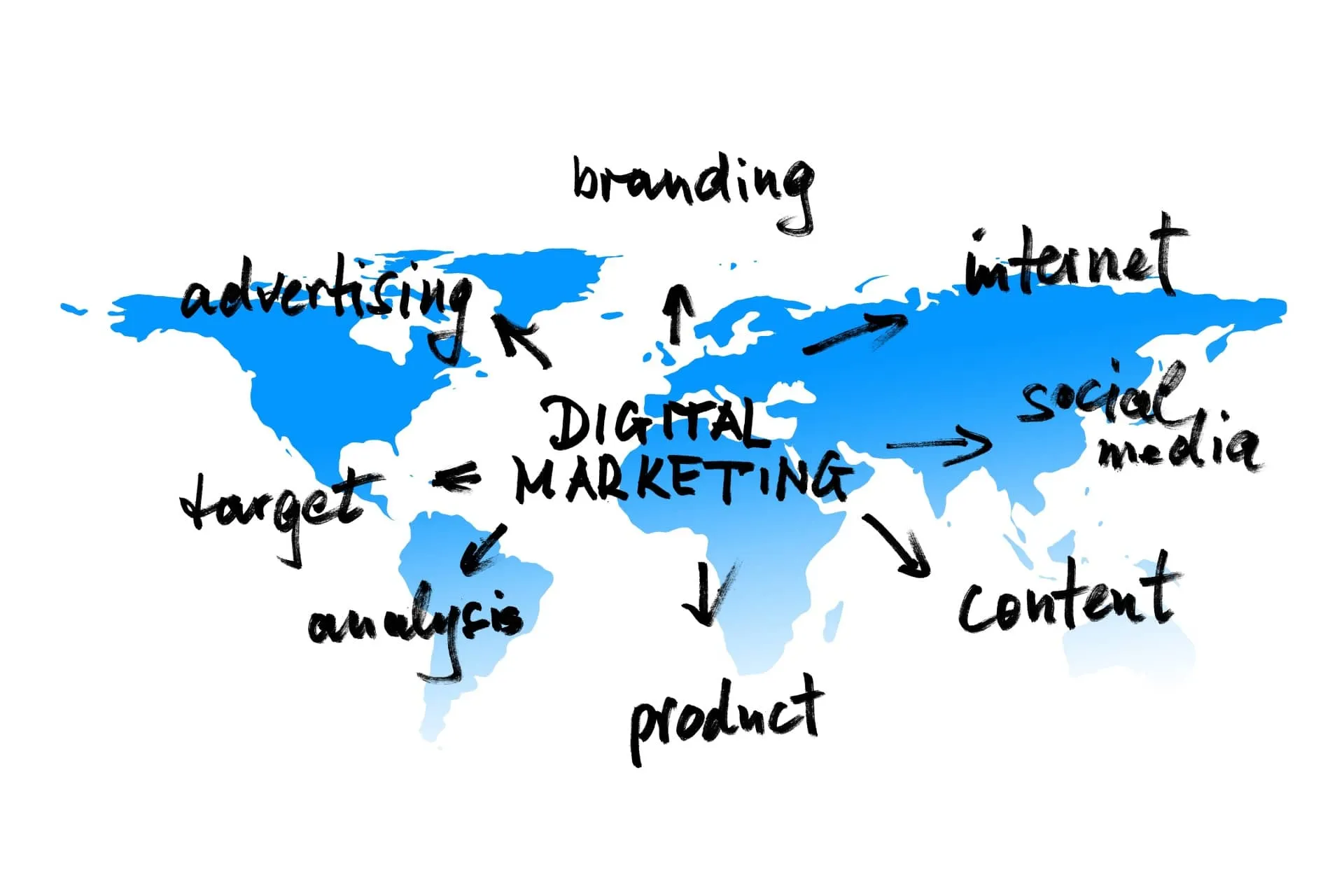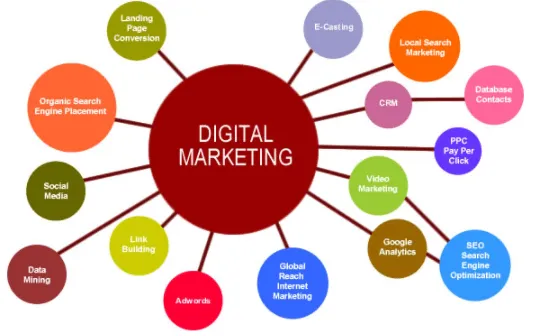The Benefits of Digital Marketing
What is Digital Marketing?
Digital marketing, also called online marketing, refers to the marketing efforts of promoting a product, service, or brand through various digital channels such as search engines, social media, email, and websites to connect with current and potential customers.

Importance of Digital Marketing in Today's Business World
It has become an essential component of any business's marketing strategy, as more and more consumers are turning to the internet to research and make purchasing decisions.
In today's digital age, it is crucial for companies to have a strong online presence in order to compete and thrive in their respective industries.
Overview
In this article, we will delve into the different components of digital marketing and provide tips for creating a successful strategy.
We will also discuss best practices for each component and share insights on the future of digital marketing.
Whether you are a small business owner or a marketing professional, this article will provide valuable information to help you navigate the ever-evolving digital landscape.
Why is Digital Marketing Important?
By implementing an omnichannel digital marketing strategy, marketers can collect valuable insights into target audience behaviors while opening the door to new methods of customer engagement.
Additionally, companies can expect an increase in retention.
According to a report by Invesp, companies with strong omnichannel customer engagement strategies retain an average of 89% of their customers.
Compare that to companies with weak omnichannel programs and they have a retention rate of just 33%.
Companies with strong omnichannel customer engagement strategies retain an average of 89% of their customers.
Compare that to companies with weak omnichannel programs and they have a retention rate of just 33%.
- Invesp, www.invespcro.com

Main Components of Digital Marketing
Search Engine Optimization (SEO)
SEO refers to the process of optimizing a website or web page to rank higher in search engine results pages (SERPs).
It is defined as increasing a website’s ranking in online search results, and therefore its organic site traffic, by using popular keywords and phrases.
SEO involves various techniques such as keyword research, on-page optimization, and internal and external linking.
Strong SEO strategies are hugely influential in digital marketing campaigns since visibility is the first step to a lasting customer relationship.
By improving the visibility of a website in search engine results, it can drive more traffic to the site and increase brand awareness.
Pay-Per-Click Advertising (PPC)
Paid search — also known as pay-per-click (PPC) advertising — is a type of online advertising where businesses pay each time an ad is clicked.
PPC ads are typically displayed on search engine results pages, social media platforms, and websites.
These ads charge you for every click and can be tailored to appear when certain search terms are entered.
PPC advertising can be an effective way to quickly drive traffic to a website and generate leads. It requires a clear understanding of ad copywriting, targeting, and budget management.
Social Media Marketing
Social media platforms are used to promote a product, service, or brand.
Social media is everywhere, so your business must be active on several different platforms.
However, the key to effective social media marketing goes far beyond simply having a few social media accounts.
Social media marketing can include creating and sharing content, engaging with followers, and running paid advertising campaigns.
It can be a great way to build brand awareness, increase website traffic, and connect with customers.
A common mistake for a business using social media is failing to post frequently or get the tone of posts completely wrong.
Again, know your audience, and what they want.
Email Marketing
Email marketing is the process of sending targeted messages to a group of people via email.
After more than two decades, email is still the quickest and most direct way to reach customers with critical information.
Email marketing can include newsletters, promotions, and updates about a business. It can be an effective way to build relationships with customers and drive repeat business.
Today, successful email campaigns must be incredibly engaging, relevant, informative, and entertaining to not get buried in your customer’s inbox.
Timing and scheduling are important — don’t bombard customers’ inboxes with repetitive or irrelevant messaging, or they could hit the unsubscribe button
Content Marketing
This is the process of creating and distributing valuable and relevant content to attract and engage a target audience.
Content marketing can include blog posts, videos, infographics, and more.
It can be a great way to establish a business as a thought leader in its industry and drive organic traffic to a website.
Effective content marketing is not outwardly promotional in nature, but rather serves to educate and inspire consumers who are looking for information.
When you offer content that’s relevant to your audience, it can establish you as a thought leader and a trustworthy source of information.
Mobile Marketing
Mobile marketing is a strategy that focuses on reaching customers through their mobile devices, such as smartphones and tablets.
This can include tactics such as SMS text message marketing, mobile app advertising, and mobile-optimized email marketing.
The goal of mobile marketing is to deliver personalized, timely, and relevant messages to consumers in a format that is easy to consume on a small screen.
With the increasing use of mobile devices and the growing importance of mobile optimization, mobile marketing has become an essential component of a comprehensive digital marketing strategy.
Mobile devices are kept in our pockets, sit next to our beds, and are checked constantly throughout the day.
This makes marketing on mobile incredibly important — two-thirds of consumers can recall a specific brand they have seen advertised on mobile in the last week — but mobile is also very nuanced considering its intimate nature.
Marketing Automation
Marketing automation utilizes technology to streamline repetitive and tedious tasks for digital marketers.
This allows marketers to focus on more high-value activities such as analyzing data and developing strategy.
Marketing automation software typically includes features such as lead management, email and social media marketing, and analytics, which can help businesses to improve their marketing efficiency and effectiveness.
The goal of marketing automation is to nurture leads, optimize customer engagement and ultimately increase conversions and sales.
It can be integrated with other digital marketing tools such as CRM and analytics to provide a comprehensive view of customer engagement and behavior.
Marketing automation is an integral platform that ties all of your digital marketing together.
In fact, companies that automate lead management see a 10% or more bump in revenue in six to nine months’ time.
Without it, your campaigns will look like an unfinished puzzle with a crucial missing piece. Marketing automation software:
-
Streamlines marketing tasks and workflow
-
Measures results
-
Calculates the ROI of your digital campaigns
Marketing automation can help you gain valuable insight into which programs are working and which aren’t.
And it will provide metrics to allow you to show digital marketing’s efforts on your company’s bottom line.

How Does Digital Marketing Work?
Digital marketing uses a range of strategies to reach customers, whether the aim is to tempt them into making a purchase, increase their brand awareness, or simply engage with your brand.
Modern digital marketing comprises a broad system of channels, including:
-
Social Media
-
Content Marketing
-
Website Marketing
-
SEO (Search Engine Optimization)
-
PPC (Pay Per Click) Advertising
To reap the real capability of digital advertising, marketers must look into today’s sizable cross-channel world to learn techniques that make an impact with engagement advertising.
Engagement marketing is the method of forming meaningful interactions with potential and returning customers based on the data you collect over time.
By engaging customers in a digital landscape, you build brand awareness, position yourself as a thought leader, and place your business at the forefront when the customer is ready to buy.
Digital Marketing vs Traditional Marketing
Unlike traditional methods, digital marketing helps you reach a larger audience and target prospects who are most likely to buy your products and services.
Additionally, it is more cost-effective than traditional marketing.
Although digital marketing may appear to be a novel concept, it is rooted in traditional marketing principles and necessitates a combination of foundational marketing knowledge and technical expertise.
Traditional media is a great way to reach a broad consumer base, whereas digital media has the ability to reach very specific audiences.
A key point is that depending on the target audience, some channels are more effective than others.
What are the Major Goals of Digital Marketing?
At its highest level, digital marketing has three main components:
-
Lead Generation
-
Lead Capturing
-
Lead Nurturing
The role of a good digital marketer is to take those [marketing] materials and repurpose them across different online channels and mediums.
Digital Marketing Best Practices
Search Engine Optimization (SEO)
-
Conduct keyword research to identify relevant terms and phrases that your target audience is searching for
-
Optimize your website's title tags, meta descriptions, and headings to include these keywords
-
Create high-quality, informative, and engaging content that is relevant to your target audience
-
Build high-quality backlinks from reputable websites to improve your website's authority
-
Monitor your website's performance using analytics tools to identify areas of improvement
Pay-Per-Click Advertising (PPC)
-
Conduct keyword research to identify relevant terms and phrases to target
-
Create clear and compelling ad copy that highlights the benefits of your product or service
-
Use negative keywords to exclude irrelevant searches
-
Use targeting options such as location, demographics, and interests to reach your desired audience
-
Monitor and optimize your campaigns regularly to improve performance and reduce costs
Social Media Marketing
-
Identify the social media platforms that your target audience is most active on
-
Create a content calendar to plan and organize your social media posts
-
Create engaging and shareable content that aligns with your target audience's interests
-
Use social media analytics tools to track engagement and measure the success of your campaigns
-
Use paid advertising options to reach a larger audience and drive specific actions such as website visits or sales
Email Marketing
-
Build a targeted email list of individuals who have opted in to receive your emails
-
Create email campaigns that align with your target audience's interests and needs
-
Use segmentation to personalize emails and make them more relevant to the recipient
-
Use A/B testing to optimize the subject line, layout, and call-to-action
-
Use analytics tools to track open rates, click-through rates, and conversion rates
Content Marketing
-
Identify the topics that your target audience is interested in and create content that aligns with these interests
-
Use a variety of content formats such as blog posts, videos, infographics, and more
-
Optimize your content for search engines by including relevant keywords and meta tags
-
Use analytics tools to track engagement and measure the success of your content
-
Use content promotion to reach a larger audience and drive specific actions such as website visits or sales
Essential Digital Marketing Skills
Digital marketers may focus on one area that they specialize in, although they are more likely to hold a variety of skills related to digital marketing.
Niche areas in the digital marketing sphere include content marketing focused on:
-
Search Engine Optimization (SEO)
-
Content Copywriting
-
Creating/Editing Visuals
-
Pay-per-click (PPC) advertising (ie:Google ads, social media marketing)
-
Email Marketing
-
Video/Webinar presentations
-
Data and Analytics
Frequently Asked Questions About Digital Marketing
What skills do you need for digital marketing?
This depends on what job role within digital marketing you’re interested in. Generally speaking, a sharp, incisive mind with an eye for detail is really useful for analytical roles — such as SEO — as is an understanding of data. Creativity and imagination are great for content, social media and strategy positions.
What is a digital marketing strategy?
A digital marketing strategy is the creation of an overarching plan to achieve certain goals and aims for a business. It will draw on cross-channel planning — PPC, social media, content creation, SEO — across a period of time to deliver the best results for your business. It can be flexible if you need to tweak plans.
Why do I need digital marketing?
If you haven’t yet embraced digital marketing, what are you waiting for? Businesses that don’t use digital marketing run the risk of missing out — it’s where your customers are, and definitely where your future customers are.
Digital Marketing Success
Successful marketing relies on connecting with the intended audience at the appropriate location and time.
In today's digital age, where consumers spend a significant amount of time online, the internet is the ideal place to reach them.
Businesses around the globe are utilizing effective digital marketing techniques to ensure their marketing efforts are more likely to connect with customers and ultimately drive significant revenue growth.
Conclusion - Integrate Digital Marketing Into Your Business Strategy
Digital marketing is an essential component of any modern business strategy.
It allows businesses to reach and engage with their target audience in ways that were previously not possible.
By understanding the various components of digital marketing, such as SEO, PPC, social media marketing, email marketing, and content marketing, businesses can create a successful digital marketing strategy that will help them achieve their goals.
Furthermore, by following best practices for each component of digital marketing, businesses can optimize their efforts and achieve even better results.
Whether you are a small start-up or a large enterprise, a well-executed digital marketing strategy can make all the difference.If you're looking to improve your digital marketing efforts, why not try a free digital marketing software?
With this digital marketing software, you can easily manage and optimize your campaigns, track your results, and make data-driven decisions.
Don't miss out on the opportunity to revolutionize your online business strategy!
Click here to see how this free digital marketing platform can bring you real results.
Start seeing the success you deserve today - Watch the Masterclass! ⤵
© 2025 Em Ay Marketing LLC. All Rights Reserved.






